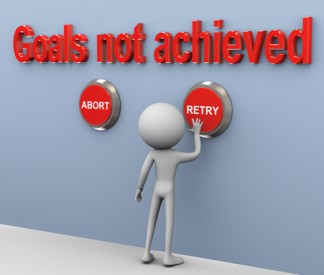Setting goals is the first step toward turning your dreams into reality, but staying committed to those goals can be a challenge. Life’s distractions, unexpected setbacks, and shifting priorities can all make it difficult to stay on course. However, by employing 5 Simple Techniques to Hold on to your Goals, you can strengthen your resolve and keep your goals in sight, no matter what obstacles come your way. In this article, we’ll explore five effective strategies that will help you hold on to your goals and ensure that you continue making progress toward your ambitions, even when the journey gets tough.
Why do we fail?
Let’s keep it simple: do you struggle a lot to achieve your goals? Well, Hold on to your goals; the answer is in affirmative. We all have to struggle once we define a goal. No matter how big or small the goal may be, the element of struggle is always there. So what exactly do we demand when we set up a goal? Success, satisfaction, and stability, right?
Whenever we plan things, we always approach them with a positive perspective, envisioning a win-win situation. We create detailed plans, thinking through various scenarios and preparing ourselves to succeed. However, even the most well-laid plans can sometimes go awry. This raises an important question: If we plan so well, then why do we fail at times? Why do we lose that initial spark that ignites our passion and drives us forward? The answer lies in the very nature of life itself. Life is unpredictable; it throws curveballs at us when we least expect them. Situations can change abruptly, events can spiral out of control, and despite our best efforts, our plans can fail. As a result, we experience a loss of focus and concentration, leading us to feel disheartened and defeated.
When this happens, our immediate response is often to play the blame game. We start pointing fingers at everything and everyone around us. When that spark is lost, we find it easier to blame external factors—our friends, family, gadgets, busy life, financial issues—and the list goes on. But in reality, these external factors are not the true cause of our problems. They have always been there, and they will continue to exist. The real issue lies within us; it is our choice to give up control and allow these external influences to steer our lives. This realization is crucial because it empowers us to take back control and reignite the spark within us.
To regain control and maintain focus in the face of adversity, we can rely on simple techniques that are both effective and easy to implement. These simple techniques can help us navigate the unpredictable nature of life, allowing us to stay focused on our goals even when things don’t go as planned. One of the most effective simple techniques is practicing mindfulness. By being present in the moment and fully aware of our thoughts and emotions, we can prevent ourselves from becoming overwhelmed by external circumstances. Mindfulness helps us acknowledge our challenges without letting them consume us, enabling us to stay centered and focused on what truly matters.
Another simple technique that can make a significant difference is setting small, achievable goals. When life becomes chaotic, and our grand plans start to crumble, it’s easy to feel overwhelmed. However, by breaking down our larger goals into smaller, more manageable tasks, we can maintain a sense of progress and achievement. These smaller victories help rebuild our confidence and keep the momentum going, even when everything else seems to be falling apart. This approach allows us to adapt to changing circumstances without losing sight of our ultimate objectives.
In addition to mindfulness and goal-setting, another simple technique is the practice of gratitude. When faced with unexpected challenges, it’s natural to focus on what’s going wrong. However, by deliberately shifting our focus to what’s going right, we can change our mindset and regain a positive outlook. Gratitude helps us recognize the good in our lives, even in difficult times. This positive shift in perspective can reignite the spark within us and help us stay motivated despite the obstacles we face.
Another simple technique to consider is maintaining a routine. Routines provide structure and stability, which can be incredibly grounding during times of uncertainty. By establishing a daily routine that includes activities such as exercise, meditation, or journaling, we create a sense of normalcy that can help us stay focused. These activities act as anchors, keeping us steady and preventing us from drifting too far off course when life gets unpredictable.
In addition to these techniques, self-compassion is another powerful simple technique that can help us navigate setbacks and failures. When plans fail, it’s easy to be harsh on ourselves, criticizing our actions or decisions. However, practicing self-compassion allows us to treat ourselves with kindness and understanding, acknowledging that everyone makes mistakes and faces challenges. By being gentle with ourselves, we can recover more quickly from setbacks and continue moving forward without getting bogged down by self-doubt.
Finally, it’s important to remember that adaptability is key. No matter how well we plan, there will always be elements beyond our control. Embracing adaptability as a simple technique allows us to be flexible in our approach and adjust our plans as needed. This doesn’t mean abandoning our goals but rather finding new paths to achieve them when the original route is blocked. By staying adaptable, we can turn obstacles into opportunities and continue making progress even in the face of adversity.
In conclusion, while life’s unpredictability can throw us off course and make us question our plans, it’s crucial to remember that we have the power to regain control. By avoiding the blame game and instead focusing on simple techniques such as mindfulness, setting small goals, practicing gratitude, maintaining routines, showing self-compassion, and embracing adaptability, we can reignite the spark within us and stay on track toward our goals. These simple techniques empower us to face life’s challenges with resilience and determination, ensuring that we continue moving forward no matter what obstacles come our way.
What’s after failure?
 When you are faced with such a situation, all you have to do is figure out a way to hold on to your goals, keep things in balance, minimize those external interferences, and focus. Keep your mind and body healthy and balanced. A mind clouded with thoughts is always unable to focus, so cut out the distractions; don’t let your thoughts stray away.
When you are faced with such a situation, all you have to do is figure out a way to hold on to your goals, keep things in balance, minimize those external interferences, and focus. Keep your mind and body healthy and balanced. A mind clouded with thoughts is always unable to focus, so cut out the distractions; don’t let your thoughts stray away.
However, staying on track and holding on to your goals is not as simple and easy as it sounds. A study conducted at the University of Hertfordshire, London, showed that every year 50 % of the people decide a goal for themselves as a New Year’s resolution, but the striking thing is more than 78% of the people fail to achieve their goal, the reason being a lack of focus and concentration. So it’s very important, while setting up the goals, that the importance of the lack of focus hampering the achievement is considered and a strategy is made accordingly.
Focus on gaining strategies to hold on to your goals:
 Each one of us becomes a victim of lack of focus at some stage in life so here is the good news: you are not alone; moreover, there are ways of overcoming it. Hold on to your goals. Below are some of the techniques that can help you make it through your journey. If followed properly and consistently, you will see a considerable improvement in your focus and a striking difference in your performance. This will boost your confidence and give your motivation a boost.
Each one of us becomes a victim of lack of focus at some stage in life so here is the good news: you are not alone; moreover, there are ways of overcoming it. Hold on to your goals. Below are some of the techniques that can help you make it through your journey. If followed properly and consistently, you will see a considerable improvement in your focus and a striking difference in your performance. This will boost your confidence and give your motivation a boost.
- Prioritize: Having numerous goals sounds exciting, and it’s easy to get caught up in the idea of accomplishing many things at once. However, the reality is that you cannot focus effectively on multiple objectives simultaneously. To maximize your chances of success, it’s crucial to prioritize and keep your list of goals small and manageable. This is one of the simple techniques that can significantly improve your productivity and help you achieve your objectives more efficiently.The concept of prioritization might seem straightforward, but in practice, it requires discipline and a clear understanding of your most important goals. One of the simple techniques to achieve this is to start by making a comprehensive list of all your goals. Once you have everything written down, rank these goals in order of importance, keeping the most critical ones at the top of your list. This step is essential because it helps you focus your energy and resources on what truly matters, ensuring that you make meaningful progress on your top priorities before moving on to other tasks.
After organizing your goals, the next step is to set a realistic timeframe for completing each one. This is another one of the simple techniques that can help you stay on track and maintain momentum. Assigning a specific period to each goal not only provides a sense of urgency but also allows you to measure your progress along the way. It’s important to be both ambitious and realistic when setting these timelines—challenge yourself, but also ensure that your deadlines are achievable. By following this approach, you create a structured plan that guides you through the process of achieving your goals step by step.
It’s crucial to remember that prioritizing doesn’t mean discarding the goals that are lower on your list. Instead, see these as goals that you will eventually tackle once you’ve completed your top priorities. This is where another of the simple techniques comes into play: patience. Understand that it’s okay to focus on a few things at a time. As you complete the most important goals, the others will naturally move up the list. Over time, you’ll find that you’ve made significant progress on all fronts, but without the stress and burnout that often accompany trying to do too much at once.
One of the biggest pitfalls people encounter when trying to achieve multiple goals is spreading themselves too thin. When you divide your time, energy, and resources across too many tasks, you end up making only marginal progress on each, which can be incredibly frustrating. This is why one of the most effective simple techniques is to focus intensely on a narrow range of goals rather than trying to conquer everything at once. By doing so, you allow yourself to dive deep into each goal, applying your maximum potential and energy. This concentrated effort often leads to better results, as you’re able to fully immerse yourself in the task at hand, giving it the attention it deserves.
Moreover, prioritizing and focusing on a few goals at a time can lead to a sense of accomplishment and motivation. Each time you complete a goal, you experience a boost in confidence, which fuels your drive to tackle the next challenge. This positive reinforcement is one of the simple techniques that keeps you moving forward, even when the path ahead seems daunting. The satisfaction of ticking off one goal after another creates a momentum that propels you toward achieving all the goals on your list.
In addition to prioritizing your goals and focusing on one at a time, another of the simple techniques you can use is regular reflection. Periodically review your progress and assess whether your current priorities are still aligned with your long-term objectives. Life is dynamic, and your goals may evolve over time. By reflecting on your progress, you can make adjustments to your plan, ensuring that you remain on course to achieve your most important aspirations.
In the end, you’ll find that by following these simple techniques—prioritizing your goals, focusing on a few at a time, setting realistic deadlines, and regularly reflecting on your progress—you will be able to achieve much more than if you tried to tackle everything at once. The process of prioritization might require some effort and discipline initially, but the rewards are well worth it. You’ll not only accomplish your goals more efficiently, but you’ll also reduce stress and increase your overall satisfaction with your progress.
By the time you’ve worked your way through your list of goals, you’ll realize that you’ve achieved everything you set out to do, and perhaps even more. Each goal completed will have paved the way for the next, creating a domino effect of success. So, take the time to prioritize, focus, and use these simple techniques to make your ambitions a reality. In doing so, you’ll not only achieve your goals but also set a strong foundation for continued success in all areas of your life.
- Divide and rule: Let’s imagine you have to conquer a state. Hold on to your goals. How do you think you would do that? Obviously, by taking small steps—first conquering the cities, then finally moving on. How about I ask you to build an aircraft? Hold on to your goals. The foremost steps will include acquiring blueprints, gathering the materials, selecting the right tools, and so on and so forth. Hold on to your goals. same goes for the bigger goals; you cannot achieve them all at once. Hold on to your goals. You will have to make smaller goals out of the bigger ones. Hold on to your goals. Arrange your goals in such a way that the goals first on the list are subsets of a bigger goal so that when you achieve them, you see yourself making progress at a certain level. Hold on to your goals. Following this chain of subsets, you will ultimately complete your bigger goal. Hold on to your goals.
- Check and balance Managers:Yes, who are they? Why do you need them? They are not aliens; rather, they are your loved ones, your family, and your friends. They are the people you respect and value. So what is their role? They help you maintain focus and not lose enthusiasm when faced with difficulties, failures, and stressful situations. When you brag about your achievements in front of them, you get acknowledgment, and that acknowledgment gives you the confidence to hold on to your goals. They celebrate your success and advise you when you need it the most. Not until your goals are personal; it’s always good to have people around who are concerned because that lets you stay focused.
- Keeping track of your progress: Success in achieving a goal comes with the progress that you make when you start from scratch. This makes keeping a record of your progress important so that you know how much you have achieved? How far have you got to go? And is everything going according the plan or are amendments to be made? This is only possible if you develop the habit of keeping a journal for your goal. The journal has all your achievements, feelings, plans and targets written at the same place, which makes it easier for you to analyze and decide your next step. Moreover, it’s a source of excellent feedback for you. You can always go back, skim through it, make changes to plan and decide your future steps in light of your past experiences.
- Feed your brain. Hold on to your goals; by that, I mean feed it with the purpose of setting a particular goal. Never let your mind forget the reason you decided to do a particular thing. Let your subconscious work for you; utilize its immense power to keep that motivation alive. The brain processes picture memory; it has nothing to do with that whole film, it works frame by frame, just like a movie maker. That’s the hook! Feed it with pictures of the purpose that made you set the goal. For that, take a poster board, any electronic board, even the bare wall of your room, and fill it with pictures all over. Create that environment so that when you are not thinking consciously, your brain is doing the work for you at a subconscious level, helping you maintain that motivation.
Consistency is the key. Hold on to your goals. Most people fail not because they do not have the required level of knowledge, skill or strategy to achieve a goal but because they give up on it. They stop trying. People lose the courage to get up after a failure. They give in to their fate easily, lose focus and repent later.
The choice is yours to make; do you want to be among those who achieved what they dreamed of? Or those who gave up just because they surrendered to their lack of focus? At the start of every goal, the enthusiasm is at its peak and one feels like taking over the world all at once, but that rush soon goes away; that’s the critical time where you lose focus and take the path of those who dream, give up and then repent. Following these simple techniques, you can help yourself through your journey staying focused.



